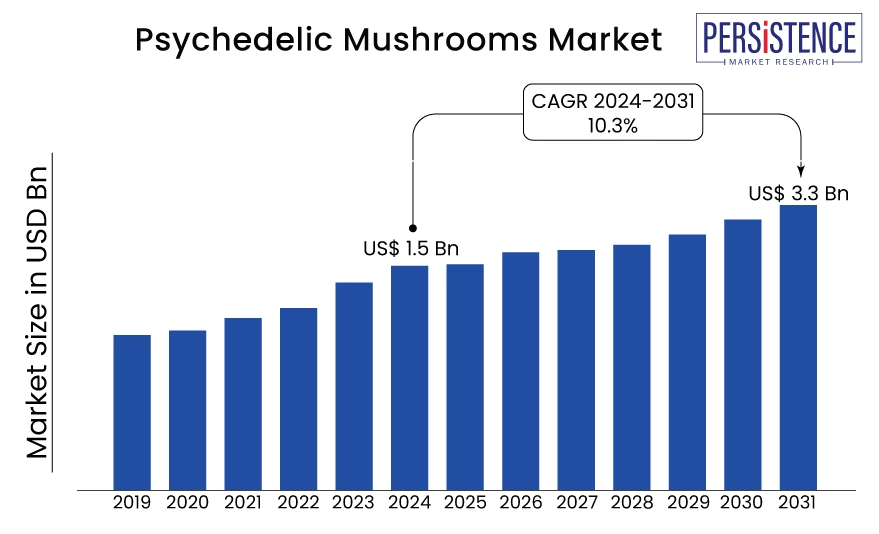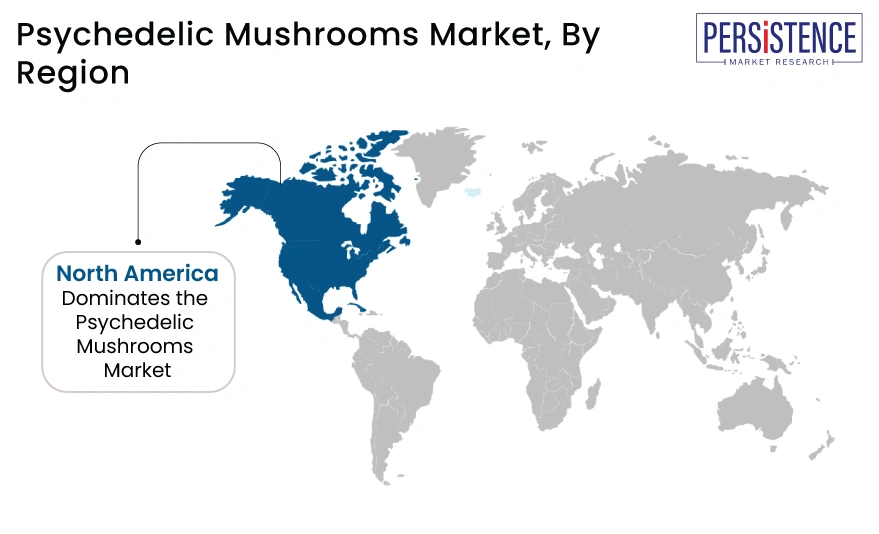Psychedelic Mushrooms Market
Industry: Food and Beverages
Format: PPT*, PDF, EXCEL
Delivery Timelines: Contact Sales
Report Type: Ongoing
Report ID: PMRREP34489
The global psychedelic mushrooms market is estimated to value at US$3.3 Bn by the end of 2031, ascending from US$1.5 Bn estimated to be recorded by the end of 2024. The market is expected to exhibit a CAGR of 10.3% during the forecast years, from 2024 to 2031.
|
Attributes |
Key Insights |
|
Psychedelic Mushrooms Market Size (2024E) |
US$1.5 Bn |
|
Projected Market Value (2031F) |
US$3.3 Bn |
|
Global Market Growth Rate (CAGR 2024 to 2031) |
10.3% |
|
Historical Market Growth Rate (CAGR 2019 to 2023) |
8.12% |
Psychedelic mushrooms, popularly referred to as the magic mushrooms, fall under the umbrella of specialty mushrooms that predominantly contain certain psychoactive compounds like psilocybin, and psilocin. While these compounds are believed to potentially benefit those suffering mental health conditions such as depression, anxiety, PTSD, and addiction, there is a substantial legal and regulatory challenge surrounding these substances, across various regions.
While there has been a lot of research on how these mushrooms can be exploited therapeutically, the demand for therapeutic use continues to be rare, says the National Institute on Drug Abuse. As the magic mushroom has a perception of much more as a hallucinating substance than a drug, it clearly holds a lot of abuse potential.
Magic mushrooms are consumed fresh, or cooked. Several consumers prefer these mushrooms brewed into tea. Moreover, the dried mushroom version is at times smoked and further mixed with tobacco, or cannabis. Psilocybin is the key ingredient in psychedelic mushrooms, which renders the mushroom its psychoactive and hallucinogenic properties.
LSD, a prominently used hallucinogen, has recently been witnessing the uprise of some other categories, including psilocybin (found in magic mushroom). The rate of consumption is experiencing dramatic rise, which further points to possible public health concerns.
The psychedelic mushrooms market is on the cusp of substantial growth. Increasing research, changing regulatory landscapes, and growing public acceptance are collectively driving market growth worldwide.
While challenges such as legal restrictions, safety concerns, and cultivation complexities remain, the potential for medical advancements, and product innovation presents significant opportunities for the psychedelic mushrooms market players.
As more regions adopt a progressive stance on psychedelics, and encourage research to validate the psychedelic mushrooms benefits, the market is expected to see sustained growth and diversification.
Continued advocacy, an influx of investments in research, and strategic innovation will be crucial to realizing the full potential of the psychedelic mushrooms market in the years to come.

Therapeutic Potential
Consistently growing research efforts points to the potential use of psychedelic mushrooms in treating various mental health disorders, the most prevalent include anxiety, depression, addiction, and PTSD.
Although there are legal restrictions that limited detailed research until recently, several modern studies are now reviving research interest in psilocybin's therapeutic potential. This is likely to contribute to market growth to a large extent.
Research has found the mushroom’s link to neuroplasticity, and neurogenesis multiple times. While all types of mushrooms are known to impact the heath of human brain to some extent, it is more sufficient a booster to the explosion in mushroom popularity across all sectors.
Psychedelic mushrooms particularly tend to open a window of neuroplasticity, finds a study, in addition to enduring certain neuroplastic changes. Moreover, clinical trials of magic mushrooms have shown relieved patients of mental health conditions.
Based on this, research has been focusing on the potential clinical applications of these mushrooms in treatment or even prevention of some of the widely prevalent neurodegenerative disorders like Alzheimer’s, and Huntington’s disease.
Favorable Regulatory Changes
Regulatory guidelines surrounding the overall blanket sector of psychedelic substances are evolving over the past decade. Some of the regulatory changes have been favorable, especially in countries like the US, Canada, the UK, and the Netherlands.
These countries call for or exempt psilocybin reclassification for potential therapeutic use. Legalization of marijuana indicates widening scope for market expansion further in the years to come.
Increased Awareness, and Acceptance Among Consumers
Rising awareness among public the growing significance of mental health, growing prevalence of mental health issues, and the possible advantages of psychedelic therapy are together boosting interest in psychedelic mushrooms worldwide.
Increasing acceptance of psychedelic mushrooms treatments is accelerating the R&D activity in the psychedelic mushrooms industry, thereby pushing the flow of investments in this field. This is all creating fertile growth environment for the psychedelic mushrooms market.
Legal Hurdles, and Regulatory Barriers
Despite the growing interest in psilocybin's therapeutic potential, the psychedelic mushrooms market faces significant challenges. Its legal status is one major hurdle to market growth.
Psilocybin remains a Schedule I controlled substance, which means it has high abuse potential, and no accepted medical use. This classification makes research, production, and sales of psychedelic mushroom difficult.
Strict legal restrictions in many countries pose significant challenges to market growth. Psychedelic mushroom’s status as the Schedule I substance in many regions limits its commercial use, and research opportunities.
Safety concerns present another significant hurdle facing the psychedelic mushrooms market growth. While not physically addictive, psilocybin can trigger disturbing hallucinations, anxiety, and panic attacks. These risks, especially for those with a family history of psychosis, could discourage potential users, and healthcare providers.
Safety Concerns, and Standardization Issues
Safety concerns related to the use of psychedelic mushrooms, and the complex cultivation processes required for these fungal species are additional barriers facing the expansion of this market. Lack of standardization in production also hinders market development.
Medical Advancements
Successful clinical trials demonstrating the efficacy of psychedelic mushrooms in treating mental health disorders have the potential to revolutionize mental health care.
Ongoing research could lead to new therapeutic applications and broader acceptance of psychedelics as viable medical treatments. This presents a significant opportunity for growth and innovation in the market.
Regulatory Relaxation
As more regions consider decriminalization (or legalization), new markets could emerge, driving demand for psychedelic mushrooms. Regulatory relaxation would also facilitate research and commercial activities, unlocking new opportunities for market expansion.
Proactive engagement with policymakers and public education campaigns are key to achieving regulatory changes.
Product Innovation
Developing new delivery methods, such as microdosing kits, novel formulations, and user-friendly administration routes, can attract a broader consumer base.
Innovations that enhance the user experience, ensure safety, and provide reliable dosing can significantly boost market growth. Companies investing in R&D to create cutting-edge products will likely lead the market in the coming years.
Psilocybe Continues to be the Dominant Type
Psilocybe mushrooms, known for their potent psychoactive properties, dominate the market. Their therapeutic potential, particularly in treating mental health issues like depression and anxiety, is well-documented.
Clinical trials, and research studies have increasingly supported their efficacy, making them the most recognized, and sought-after product type in the market.
On the other hand, gymnopilus mushrooms, noted for their psychoactive effects, are primarily used recreationally. Although less researched for therapeutic uses compared to psilocybe, they are popular in regions where recreational use of psychedelics is gaining acceptance. Their unique properties contribute to a growing niche market segment.
Panaeolus Set for Rapid Growth in Demand
The panaeolus segment is expected to grow significantly, driven by both recreational and emerging therapeutic uses. As more studies explore the potential benefits of various psychedelic compounds, panaeolus mushrooms are gaining attention for their similar psychoactive properties.
Fresh/Whole Mushrooms Lead by Form
Fresh or whole mushrooms constitute the largest market segment, largely due to their perceived superior benefits for cognitive enhancement and mood improvement.
Consumers prefer fresh mushrooms for their natural state and purportedly stronger effects. This segment thrives in both recreational and medical markets where fresh products are valued for their potency and natural origin.
Dried Form Preferred for Convenience
Dried mushrooms are favored for their convenience, longer shelf-life, and ease of transport. This form is particularly popular among users who seek to store the product for longer periods without compromising its psychoactive properties. Dried mushrooms are widely used in both research, and personal consumption contexts, providing flexibility in usage and preservation.
Processed Mushrooms Grow Attractive
Processed forms, including capsules, tinctures, and extracts, cater primarily to the medical and therapeutic markets. These products offer standardized dosages, which are crucial for clinical applications and research.
The convenience of precise dosing and ease of administration makes processed forms attractive for medical professionals, and patients seeking controlled and safe psychedelic experiences.
De-addiction to be the Largest Application Area
This segment leads the market due to the increasing adoption of psychedelic-assisted therapies for addiction treatment. Studies have shown that psilocybin can significantly reduce dependency on substances like alcohol and nicotine.
The promising results from clinical trials are encouraging more healthcare providers to incorporate psychedelics into de-addiction programs, driving demand in this application.
Recreational Application Gains Traction
The recreational use of psychedelic mushrooms is gaining traction, especially in regions where legal frameworks are becoming more relaxed. Public interest in the mind-altering experiences offered by psychedelics is growing, supported by cultural shifts and advocacy for responsible use. This segment is expanding as societal attitudes evolve, and legal restrictions ease.
Market to Witness a Boom in Therapeutic Applications
The therapeutic application of psychedelic mushrooms is increasingly prevalent in clinical settings for treating mental health disorders. Enhanced research and positive clinical trial outcomes have underscored the efficacy of psychedelics in managing conditions like PTSD, depression, and anxiety. The growing acceptance of psychedelics as legitimate medical treatments is bolstering this segment’s growth.
North America Represents a Commanding Market Share
The America’s psychedelic revolution continues to accelerate, fostering the psychedelic mushrooms market growth. There has been a surprisingly increasing acceptance among population, of mind-altering drug substances, especially in the US, which is one of the strongest growth drivers of the market for psychedelic mushrooms.
Led by the US, followed by Canada, North America holds a dominant market share, driven by progressive legislation, substantial research funding, and a growing number of clinical trials.
States like Oregon, and Colorado are leading the charge in legalizing and regulating the use of psychedelics. The robust investment landscape and active advocacy movements are further propelling market growth in this region.
A recent research study at University of Michigan shows the use of magic mushrooms and similar hallucinogens by young adults has grown twofold in just three years, till 2023.
The American psychedelic mushrooms market was valued at more than US$1.5 Bn in the year 2022 and is expected to show over 10% annual growth in the upcoming years. Individuals suffering conditions like addiction, depression, and anxiety are responsible for triggering billion dollars investments in this area.

Regulatory Support Creates Tailwinds for Europe
Europe also reflects a rapidly expanding market, predominantly fueled by favorably changing regulations, and increased research activities. Countries like the Netherlands, known for their liberal drug policies, and the UK, with its growing interest in psychedelic research, are at the forefront.
The European market benefits from a supportive regulatory environment, and strong public interest in alternative therapies. Recently, a notable rise has been recorded in the use of magic mushroom in England, and Wales, especially among consumers aged 50 and over. The Office for National Statistics (ONS) revealed in a survey that one in 100 people in these areas are likely using magic mushrooms.
Despite being classified as illegal in the UK, magic mushrooms are still obtainable online, or even grown at home. It has in fact been found that home cultivation of psychedelic mushrooms is witnessing growing preference of late.
People are developing interest in psychedelic mushrooms treatment for depression. Users here often cite improved mood, and overall wellbeing as reasons for using magic mushrooms.
Major Psychedelic Mushrooms Market Companies
Recent Developments in Psychedelic Mushrooms Industry
May 2024
A licensed couple has opened Sale, Oregon’s first psilocybin service center. The center offers psilocybin sessions for various purposes to people over 21. It provides a safe and comfortable space for people to have a psilocybin experience.
May 2024
In a study on the potential benefits of psilocybin for anorexia nervosa conducted at the Monash Biomedicine Discovery Institute, researchers investigated psilocybin's potential effects on cognitive flexibility, and weight maintenance in rats, suggesting psilocybin may be a promising treatment for anorexia.
December 2023
Red Light Holland announced its plans of distribution of GMP-manufactured psilocybin micro-dosing capsules post-successful stability testing.
|
Attributes |
Details |
|
Forecast Period |
2024 to 2031 |
|
Historical Data Available for |
2019 to 2023 |
|
Market Analysis |
US$ Billion for Value |
|
Key Regions Covered |
|
|
Key Market Segments Covered |
|
|
Key Companies Profiled |
|
|
Report Coverage |
|
|
Customization & Pricing |
Available upon request |
By Product Type
By Form
By Application
By Region
To know more about delivery timeline for this report Contact Sales

The market size is currently around US$1.5 billion.
By the end of 2031, the market for psychedelic mushrooms is expected to see a CAGR of 10.3%, reaching a valuation of US$3.3 billion.
Demand for psilocybes is experiencing traction due to their proven therapeutic benefits in treating mental health disorders and increasing acceptance of psychedelics in medical and recreational use.
The major regional markets for magic mushrooms are North America, and Europe.
The major application areas of these mushrooms include de-addiction therapies, recreational use, and therapeutic treatments for mental health disorders.